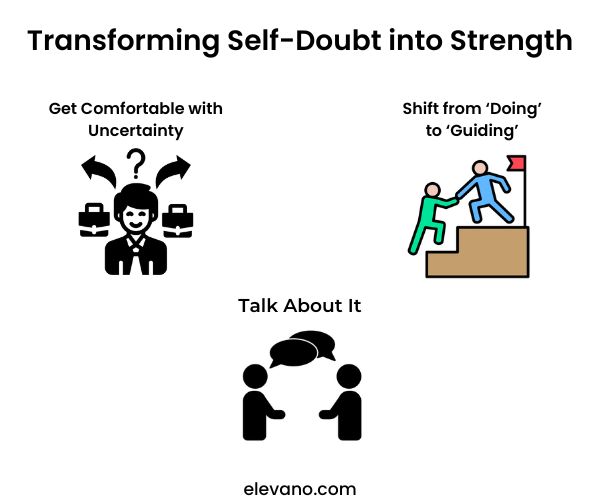Confidence defines leadership, yet even the most experienced managers wrestle with self-doubt. They lead meetings, make decisions, and guide teams—while an inner voice whispers, Do I really belong here? This is impostor syndrome, and it’s more common in engineering leadership than many realize.
Engineering leaders carry the weight of their teams’ success, balancing decision-making, morale, and work culture. But while they support others, their own struggles often go unnoticed—especially in remote environments where stress, burnout, and self-doubt are harder to detect.
In a recent conversation, Kevin Doson R, VP of Engineering at Total Expert, shared how he leads a team of 75 engineers while tackling the hidden struggles of leadership. From recognizing impostor syndrome in employees to managing its impact on decision-making, Kevin provided practical strategies to build confidence and create a supportive work environment.
His insights go beyond theory or feel-good advice. They’re experience-driven lessons that any engineering leader can apply. In this article, we’ll break down what impostor syndrome looks like, how it affects engineers and managers, and what leaders can do to turn self-doubt into strength—while making mental health a workplace priority.
Understanding Impostor Syndrome in Engineering
The Silent Struggle of Engineering Leaders
Most engineering leaders don’t talk about it. They show up, lead meetings, make decisions, and keep their teams moving forward. But behind the confident exterior, many battle an invisible challenge: the creeping feeling that they don’t actually deserve to be in charge.
Kevin Doson R, VP of Engineering at Total Expert, has seen this play out time and time again.
“I’ve had conversations with incredible engineers who step into leadership roles and suddenly feel like they’re faking it,” he shared. “It’s not about skills—it’s about confidence. And when that confidence wavers, it affects everything.”
This is impostor syndrome at work—the quiet self-doubt that makes even high-performing managers feel unqualified. And the worst part? It thrives in silence. Leaders don’t admit they’re struggling. Teams don’t realize their manager is second-guessing every decision. By the time the symptoms show, the damage is already done.
So what does this look like in practice? And how does it impact the teams relying on these leaders?
When Self-Doubt Leads a Team

A hesitant leader creates a hesitant team. It’s that simple. When managers start questioning their own abilities, their leadership style changes in subtle but destructive ways:
- They delay decisions. Fear of making the wrong call leads to endless overthinking.
- They micromanage. Instead of trusting their team, they hold onto tasks because it feels safer.
- They avoid giving feedback. They worry that correcting someone will expose their own shortcomings.
Kevin explained that this problem is magnified in remote teams. “In an office, you can see when someone’s struggling. Maybe they hesitate before speaking up, or they seem off in a meeting. But in remote work, those signals disappear. Someone can be drowning in self-doubt, and you won’t notice until things start breaking.”
He also pointed out how different leaders experience impostor syndrome:
- New managers feel the need to prove themselves. They take on too much, refuse to ask for help, and burn themselves out.
- Experienced engineers stepping into leadership struggle with identity. They used to solve complex problems hands-on—now their job is to lead rather than do. That shift can feel like they’ve lost their value.
And here’s the real danger: when a leader is unsure of themselves, their team feels it. Projects stall, innovation slows, and the team starts second-guessing their own decisions, too.
So what can leaders do to fight back against impostor syndrome? More importantly, how can companies create an environment where managers don’t have to struggle alone?
So, how do leaders break free from this cycle of self-doubt and lead with confidence?
How Can Effective Governance in AI Help Overcome Impostor Syndrome in Engineering Leadership?
Effective governance in AI fosters transparency and accountability, empowering engineering leaders to make informed decisions. By implementing smart governance for fair ai implementation, organizations can create an inclusive environment. This support not only mitigates doubts but also helps leaders recognize their true potential, alleviating feelings associated with impostor syndrome.
Breaking the Cycle: How Leaders Can Overcome Impostor Syndrome
Now that we’ve unpacked how impostor syndrome impacts engineering managers and their teams, the next step is figuring out how to break the cycle. Kevin Doson R, VP of Engineering at Total Expert, shared practical ways leaders can rebuild confidence—not just for themselves, but for their teams as well.
Recognizing the Warning Signs
Most leaders experiencing impostor syndrome don’t openly admit it, but their behavior shifts in ways that can be spotted early. Kevin outlined key red flags managers should watch for in themselves and others:
- Avoiding big decisions – Overanalyzing every option, delaying commitments, and waiting for perfect information.
- Overworking to “prove” value – Taking on extra work instead of delegating, often at the cost of personal well-being.
- Hesitating in meetings – Holding back opinions, second-guessing responses, or letting others take over discussions.
- Downplaying achievements – Brushing off compliments with “It wasn’t a big deal” or “Anyone could have done it.”
- Fear of asking for help – Believing that seeking guidance is a sign of weakness, instead of a strength.
“For managers, the tricky part is that impostor syndrome often shows up as overcompensation—working harder, doing more, trying to prove something that was never in doubt,” Kevin explained. “But that’s unsustainable. It wears people down.”
Turning Self-Doubt Into Strength

Once impostor syndrome is identified, the real work begins: rewiring thought patterns and developing habits that build confidence. Kevin shared key strategies leaders can use to fight back:
1. Get Comfortable with Uncertainty
Leadership means making decisions without always having all the answers. Instead of seeing uncertainty as failure, strong leaders accept it as part of the job. “You won’t always know if you made the right call immediately—and that’s okay,” Kevin said. “Focus on making thoughtful decisions, not perfect ones.”
2. Shift from ‘Doing’ to ‘Guiding’
Many engineering managers struggle with transitioning from hands-on coding to leading a team. Kevin emphasized that success in leadership isn’t about solving problems alone, but enabling others to solve them. “If you’re holding onto all the work because it feels safer, you’re limiting your team’s growth and your own.”
3. Talk About It
One of the best ways to defuse impostor syndrome is to say it out loud. “Most people think they’re the only ones feeling this way,” Kevin noted. “But once you start sharing, you realize that even the most successful leaders have gone through the same thing.”
At Total Expert, Kevin encourages open conversations about self-doubt. “When managers admit they’re struggling with confidence, it doesn’t make them weaker—it makes them more relatable and approachable,” he said.
Confidence Is Built, Not Given
Overcoming impostor syndrome isn’t about waiting for confidence to magically appear—it’s about building it through experience, conversation, and action.
As Kevin put it: “Leadership isn’t about knowing everything. It’s about learning, adapting, and being okay with not having all the answers. The sooner managers embrace that, the better leaders they become.”
So if you’re feeling like you don’t quite belong in the role you’re in, remember: you’re not alone. And more importantly—you do belong.
Building a Leadership Environment That Strengthens Confidence
Overcoming impostor syndrome isn’t just about changing personal habits—it’s about creating an environment where leaders can build and maintain confidence. Kevin Doson R emphasized that engineering managers don’t just inherit confidence; they develop it through experience, decision-making, and a culture that allows them to grow. The key is fostering an atmosphere where self-doubt doesn’t thrive in isolation, but is addressed openly.
Encouraging Leaders to Talk About Their Struggles
One of the biggest mistakes leaders make is assuming they’re the only ones feeling this way. When self-doubt is kept quiet, it grows stronger. Kevin shared that at Total Expert, the most effective engineering managers are the ones who admit when they’re struggling—because it normalizes the experience for others.
“People think they’re the only ones who feel like they don’t belong, but the reality is that every leader has those moments,” Kevin explained. “The ones who succeed are those who don’t let it stop them.”
Engineering leaders should take an active role in discussing impostor syndrome with their peers and teams. By acknowledging their challenges instead of masking them, they make it clear that self-doubt isn’t a sign of failure—it’s part of leadership growth.
How can leaders encourage this mindset?
- Share personal experiences – When a leader says, “I’ve felt that way too,” it shifts the perspective from isolation to shared experience.
- Ask direct questions in check-ins – Instead of just status updates, ask: “What’s been the hardest part of your role lately?”
- Make reflection a habit – Encourage managers to recognize their wins, rather than just focusing on what’s ahead.
The Importance of Recognizing Growth
One of the biggest contributors to impostor syndrome is feeling like progress isn’t happening fast enough. Kevin pointed out that many engineering managers focus so much on what they haven’t achieved that they overlook how far they’ve come.
“Most people don’t see their own growth,” Kevin said. “They assume they’re standing still when in reality, they’ve developed a lot. Sometimes, as a leader, you need to remind yourself of that.”
Leaders can fight impostor syndrome by actively tracking their progress:
- Keep a record of decisions made – Seeing past successes builds confidence in making future calls.
- Celebrate small wins – Progress isn’t just about big milestones; every step forward matters.
- Seek feedback from trusted peers – Sometimes others see our growth more clearly than we do.
Why Leadership Confidence Starts With the Right Environment
Self-doubt thrives in isolation. If leaders work in a culture where they can’t express uncertainty or talk through challenges, impostor syndrome grows unchecked. Kevin emphasized that the best engineering managers aren’t the ones who never question themselves—they’re the ones who create spaces where self-doubt doesn’t hold power.
This means leaders need an environment where:
- Mistakes are learning opportunities, not career setbacks
- Open discussions about leadership struggles are encouraged, not hidden
- Support comes from both peers and senior leadership
“Great leaders aren’t those who never feel uncertain,” Kevin said. “They’re the ones who learn how to move forward anyway.”
Final Thought: Engineering managers don’t need to have all the answers. They just need to build the confidence to keep making decisions, learning, and growing. By shaping a leadership environment that values progress over perfection, they don’t just overcome impostor syndrome—they redefine what strong leadership really looks like.
Final Thoughts: Leadership Is About Progress, Not Perfection
Impostor syndrome is common among engineering managers, but it doesn’t have to define them. Confidence isn’t about knowing everything—it’s about making decisions, learning from them, and adapting.
Kevin emphasized that the best leaders aren’t the ones who never doubt themselves—they’re the ones who push forward anyway. For managers struggling with self-doubt, the key is to take small, intentional actions:
- Recognize impostor syndrome when it appears—in yourself and your team.
- Shift focus from perfection to progress—leadership is about learning, not flawless execution.
- Build a culture of support—normalize open conversations about self-doubt and challenges.
- Lead by example—show that great leaders aren’t afraid to admit they don’t have all the answers.
Overcoming self-doubt isn’t about waiting for confidence to magically appear. It’s about taking action, refining your leadership style, and trusting that growth happens with experience.
So if you’ve ever wondered, Do I really belong here?—the answer is yes. And the best way to prove it is to step forward and lead anyway.




